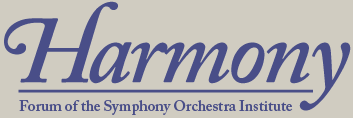The Harmony Project: Another Iteration of a Very Good Idea
The Virginia Symphony (that is Norfolk, Virginia Beach, Newport News, not Richmond) has recently received a MetLife Award for Excellence in Community Engagement for its Harmony Project, a program designed to develop relationships between the Virginia Symphony and church congregations in the African-American community. In developing this program I had two guiding principles:
Essentially, the Harmony Project is the Southeastern Virginia incarnation of the Saint Louis Symphony’s award-winning In-Unison® program, without the chorus. I had the privilege of being associated with that program during my tenure in Saint Louis, and observed that over time, this type of relationship building really worked. When I moved to Norfolk, I knew the Virginia Symphony could make a difference in its community by embarking on this type of initiative.
I had learned two important lessons about program development from my time in St. Louis:
1) Never assume anything.
2) True cultural change takes time.
During my first full season (2004-5), I talked to various African-American community leaders about the orchestra and its history…or lack thereof… with the community. One of the best pieces of advice was, “After all this time, just because you invite people to come in doesn’t mean they will run through the door.” Keeping on keeping on was clearly in order. During my second season, two African Americans were added to the board, a new Director of Education and Community Engagement was hired, and our first concerts to honor Black History Month were produced. The musicians began performing community engagement services under the provisions of their CBA.
This season the VSO received funding from the Norfolk Arts Commission to establish relationships with a minimum of three African-American congregations; orchestra musicians play at worship services, provide informances for Sunday School Experiences, and perform in small ensembles concerts for the churches. In return, the members of the congregation will purchase concert tickets and participate in other events.
This is labor-intensive work, made more challenging because the VSO does not have a staff member dedicated to just this work, and because those of us who are working on it are relative strangers to the community. The Project requires that we reach out to others for help and guidance in creating a meaningful experience for all, and at the VSO, this is week-by-week and congregation-by-congregation. However slow it may seem, through a committed effort over time, this program of music and social interaction will eventually break down barriers, increase familiarity among various communities, and engender the harmony among people for which the project was named.


No comments yet.
Add your comment